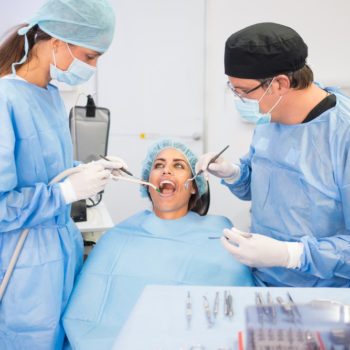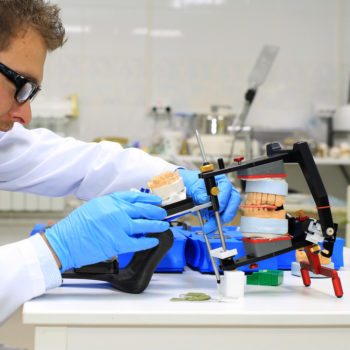Why We Love It
-
$72,720Potential Avg. Salary
-
18.7%Job Growth Rate
-
Growing DemandJob Outlook
-
Dependable Daily WorkloadCareer Attribute
Dental hygienists perform routine teeth cleanings for patients. They use specific tools to remove plaque, buildup, and stains from teeth and gums. Additionally, dental hygienists take x-rays, examine patients for signs of gum disease and cavities, and teach patients how to care for their teeth for good oral health.
Recommended Schools
What is a Dental Hygienist?
The following job responsibilities are common for individuals in dental hygienist roles:
- Use special tools to remove plaque, tartar, and stains from patients’ teeth and gums during routine cleanings
- Take x-rays of patients’ teeth to diagnose issues and assist dentists in interpreting findings
- Educate patients on how to properly care of their teeth and gums for good oral health
- Apply fluoride treatments, use lasers to treat early signs of gum disease, and apply sealants to new adult teeth to prevent cavities from forming later in life
A Day in the Life of a Dental Hygienist
Dental hygienists usually work in dentists’ offices and handle routine cleaning procedures. Patients visit dental hygienists every six months to have their teeth cleaned and checked, and hygienists use special tools to remove plaque, tartar, and stains from teeth and gums. For example, dental hygienists may use scraping tools for removing plaque buildup on teeth, lasers for healing early signs of gum disease, and a powerful toothbrush for removing stains and polishing teeth.
In some part, the tasks a dental hygienist is allowed to perform is dependent on state laws and regulations. In some states, hygienists may only be allowed to clean teeth. In others, hygienists may be permitted to perform other tasks like taking x-rays, administering fluoride treatments, and applying sealants on incoming adult teeth to help prevent cavities later in life. Dental hygienists may work with patients of a variety of ages—from early childhood to late adulthood.
Because dental hygienists are responsible for cleaning patients’ teeth, they can easily recognize when a patient is not properly taking care of his/her teeth. When a dental hygienist recognizes signs of improper oral care, he is responsible for educating the patient on proper techniques. This may include teaching patients how to brush, recommending a different sized toothbrush or use of mouthwash, educating patients on the importance of flossing, or explaining the damaging effects of sugary drinks on teeth.
Typical Work Schedule for Dental Hygienists
About half of dental hygienists work full-time hours, and half work part-time hours. Typically, dental hygienists work during normal business hours and have weekends and major holidays off of work.
Projected Job Growth for Dental Hygienists
It’s expected that demand for dental hygienists will grow significantly in the coming decade because of an increased number of people who carry dental insurance and an increased awareness of the importance of proper dental care.
Typical Employers
Most dental hygienists work for dentists that operate either an individual or group practice. However, some dental hygienists may work for franchise corporations with many offices around the U.S.
Recommended Schools
How To Become a Dental Hygienist
To work as a dental hygienist, you’ll need to have an associate’s degree in dental hygiene. The program, which usually takes three years to complete, provides both classroom and practical instruction. Students learn about anatomy, learn how to safely take and develop x-rays, and study periodontics and patient management. Dental hygienist programs must be accredited and can be found in vocational, technical, and community colleges as well as universities.
After earning an associate’s degree, dental hygienists must become licensed by the state to perform their job in that state. Each state has its own set of licensing requirements, but most require passing required written and practical examinations. Additionally, dental hygienists may be required to engage in continuing education in order to maintain their licenses, and they may also be required to become CPR-certified.
Many dental hygienists use their knowledge and experience as a basis for becoming dentists later in life. To move from a dental hygienist role into a dentist role, hygienists must earn both a bachelor’s degree and a professional dentistry degree, which could be any one of the following: Doctor of Dental Surgery (DDS), Doctor of Dental Medicine (DDM), or Doctor of Medical Dentistry (DMD). Because becoming a dentist could require ten or more years of education, working as a dental hygienist provides experience and income to aspiring dentists while pursuing required education.
Dental Hygienist Salary Data
We’ve provided you the following to learn more about this career. The salary and growth data on this page comes from recently published Bureau of Labor Statistics data while the recommendations and editorial content are based on our research.
National Anual Salary
Low Range
$60,280Average
$72,720High Range
$98,440National Hourly Wage
Low Range
$29/hrAverage
$35/hrHigh Range
$47/hrHow do Dental Hygienist salaries stack up to other jobs across the country? Based on the latest jobs data nationwide, Dental Hygienist's can make an average annual salary of $72,720, or $35 per hour. On the lower end, they can make $60,280 or $29 per hour, perhaps when just starting out or based on the state you live in.
Salary Rankings And Facts
#179 Nationally for All Careers
Above Average Salary Nationally
Programs and Degrees
Here are the most common degrees for becoming a Dental Hygienist. a is usually recommended and specifically a degree or coursework that prepares you for the particular field, see below.
Highest Education Among Dental Hygienists
- 1.7% Doctorate
- 2% Masters
- 31.9% Bachelors
- 52.8% Associates
- 8% College
- 3.1% High School
- 0.6% Less than High School
Job Growth Projections and Forecast
2014 Total Jobs
200,5002024 Est. Jobs
237,900Job Growth Rate
18.7%Est. New Jobs
37,400How does Dental Hygienist job growth stack up to other jobs across the country? By 2024, there will be a change of 37,400 jobs for a total of 237,900 people employed in the career nationwide. This is a 18.7% change in growth over the next ten years, giving the career a growth rate nationwide of Above Average.
Growth Rankings And Facts
#65 Nationally for All Careers
Above Avg. Growth Nationally
What Companies Employ The Most Dental Hygienists
| Industry | Current Jobs | New Jobs Needed | % Increase |
|---|---|---|---|
| Offices of dentists | 189,400 | 35,400 | 35% |
| Offices of physicians | 2,000 | 400 | 0% |
| Self-employed workers | 1,700 | 200 | 0% |













